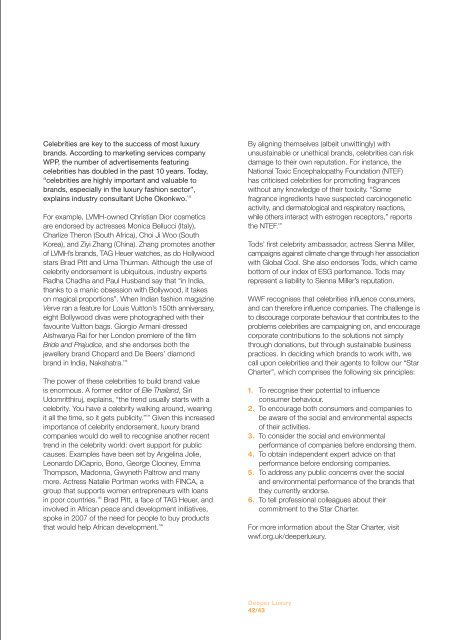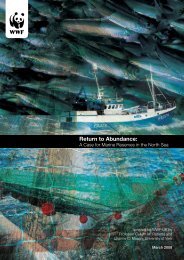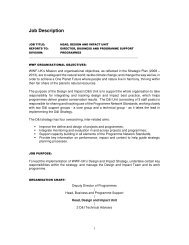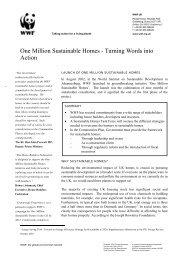Deeper Luxury Report - WWF UK
Deeper Luxury Report - WWF UK
Deeper Luxury Report - WWF UK
You also want an ePaper? Increase the reach of your titles
YUMPU automatically turns print PDFs into web optimized ePapers that Google loves.
Celebrities are key to the success of most luxury<br />
brands. According to marketing services company<br />
WPP, the number of advertisements featuring<br />
celebrities has doubled in the past 10 years. Today,<br />
“celebrities are highly important and valuable to<br />
brands, especially in the luxury fashion sector”,<br />
explains industry consultant Uche Okonkwo. 132<br />
For example, LVMH-owned Christian Dior cosmetics<br />
are endorsed by actresses Monica Bellucci (Italy),<br />
Charlize Theron (South Africa), Choi Ji Woo (South<br />
Korea), and Ziyi Zhang (China). Zhang promotes another<br />
of LVMH’s brands, TAG Heuer watches, as do Hollywood<br />
stars Brad Pitt and Uma Thurman. Although the use of<br />
celebrity endorsement is ubiquitous, industry experts<br />
Radha Chadha and Paul Husband say that “in India,<br />
thanks to a manic obsession with Bollywood, it takes<br />
on magical proportions”. When Indian fashion magazine<br />
Verve ran a feature for Louis Vuitton’s 150th anniversary,<br />
eight Bollywood divas were photographed with their<br />
favourite Vuitton bags. Giorgio Armani dressed<br />
Aishwarya Rai for her London premiere of the film<br />
Bride and Prejudice, and she endorses both the<br />
jewellery brand Chopard and De Beers’ diamond<br />
brand in India, Nakshatra. 133<br />
The power of these celebrities to build brand value<br />
is enormous. A former editor of Elle Thailand, Siri<br />
Udomritthiruj, explains, “the trend usually starts with a<br />
celebrity. You have a celebrity walking around, wearing<br />
it all the time, so it gets publicity.” 134<br />
Given this increased<br />
importance of celebrity endorsement, luxury brand<br />
companies would do well to recognise another recent<br />
trend in the celebrity world: overt support for public<br />
causes. Examples have been set by Angelina Jolie,<br />
Leonardo DiCaprio, Bono, George Clooney, Emma<br />
Thompson, Madonna, Gwyneth Paltrow and many<br />
more. Actress Natalie Portman works with FINCA, a<br />
group that supports women entrepreneurs with loans<br />
in poor countries. 135<br />
Brad Pitt, a face of TAG Heuer, and<br />
involved in African peace and development initiatives,<br />
spoke in 2007 of the need for people to buy products<br />
that would help African development. 136<br />
By aligning themselves (albeit unwittingly) with<br />
unsustainable or unethical brands, celebrities can risk<br />
damage to their own reputation. For instance, the<br />
National Toxic Encephalopathy Foundation (NTEF)<br />
has criticised celebrities for promoting fragrances<br />
without any knowledge of their toxicity. “Some<br />
fragrance ingredients have suspected carcinogenetic<br />
activity, and dermatological and respiratory reactions,<br />
while others interact with estrogen receptors,” reports<br />
the NTEF. 137<br />
Tods’ first celebrity ambassador, actress Sienna Miller,<br />
campaigns against climate change through her association<br />
with Global Cool. She also endorses Tods, which came<br />
bottom of our index of ESG perfomance. Tods may<br />
represent a liability to Sienna Miller’s reputation.<br />
<strong>WWF</strong> recognises that celebrities influence consumers,<br />
and can therefore influence companies. The challenge is<br />
to discourage corporate behaviour that contributes to the<br />
problems celebrities are campaigning on, and encourage<br />
corporate contributions to the solutions not simply<br />
through donations, but through sustainable business<br />
practices. In deciding which brands to work with, we<br />
call upon celebrities and their agents to follow our “Star<br />
Charter”, which comprises the following six principles:<br />
1. To recognise their potential to influence<br />
consumer behaviour.<br />
2. To encourage both consumers and companies to<br />
be aware of the social and environmental aspects<br />
of their activities.<br />
3. To consider the social and environmental<br />
performance of companies before endorsing them.<br />
4. To obtain independent expert advice on that<br />
performance before endorsing companies.<br />
5. To address any public concerns over the social<br />
and environmental performance of the brands that<br />
they currently endorse.<br />
6. To tell professional colleagues about their<br />
commitment to the Star Charter.<br />
For more information about the Star Charter, visit<br />
wwf.org.uk/deeperluxury.<br />
<strong>Deeper</strong> <strong>Luxury</strong><br />
42/43















![[PDF] Causes for concern: chemicals and wildlife - WWF UK](https://img.yumpu.com/31929970/1/184x260/pdf-causes-for-concern-chemicals-and-wildlife-wwf-uk.jpg?quality=85)
